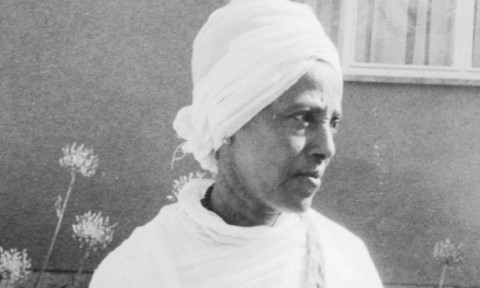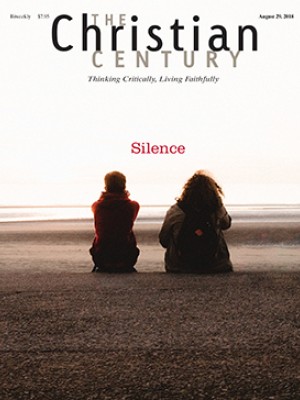The story of one Ethiopian woman—and of Christianity's encounter with modernity
Yetemegnu Mekonnen lived faithfully in turbulent times.

As home to one of the world’s oldest Christian cultures, Ethiopia preserves many practices and beliefs dating back to ancient times. But far from being a museum relic, Ethiopian Christianity is a vibrant faith in a land that has some 66 million believers. A splendid biography now gives a flavor of this faith and makes us appreciate its recent struggles.
In The Wife’s Tale (HarperCollins), British-based journalist Aida Edemariam describes the epic life of her pious grandmother, Yetemegnu Mekonnen, who lived from (roughly) 1916 to 2013. Born in the mighty imperial city of Gondar, at age eight Yetemegnu married the priest Tsega, who later rose to political prominence under emperor Haile Selassie. Through the life of this one astonishing woman we can trace the story of Ethiopia’s Christian elites in incidents that sound as if they could have come from centuries before. When the emperor is crowned in 1930, priests chant for seven days and deacons dance before the king, “sistra clashing, drums beating, bare feet stepping.” Court gatherings are blessed by “ranks of clergy in high white turbans and glowing white shemmas [shawls].”
Read our latest issue or browse back issues.
No less medieval in feel are the political hazards faced by high churchmen at the imperial court. Political missteps lead Tsega into disgrace, forcing his wife to struggle for decades to restore the family’s lands and fortunes. Scarcely remarked amid these great events are the slaves who do the menial work, which is the foundation of the leisured world of glittering aristocrats and prelates. Those same elites prosper from the heavy tithes exacted from the peasantry.
Slaves aside, this sounds like the world of Chaucer, an impression reinforced by the book’s title. Yet in the midst of this seemingly medieval world, modernity arrives suddenly in the hideous form of bombing raids launched by Italian invaders in the 1930s, targeting churches and slaughtering monks. Yetemegnu lives long enough to witness both of the crises that came close to destroying her church altogether: the Italian fascist occupation and the monstrous communist dictatorship of the Derg, which ruled from 1974 to 1991.
The Derg were hardly less vicious than their better-known contemporaries, Cambodia’s Khmer Rouge. For Ethiopia’s Christians, the worst period was the Red Terror that raged through the late 1970s, followed by a state-induced famine in the mid-1980s that killed a million. Yetemegnu hears frequent news of murders and death squads, disappearances and massacres. Most traumatic was the 1979 murder of the holy Abune [Patriarch] Theophilos, falsely accused of hoarding food and of immoral behavior with women, and then strangled. When the Derg fell, Theophilos was proclaimed a martyr and canonized. It’s a reminder of how frequently persecution has threatened modern-day Christians. Yetemegnu’s firsthand experiences are harrowing.
Quite apart from that political story, the book is richly informative about the everyday assumptions of those African Christians whose thought-worlds so often resemble the European Middle Ages and of the ancient Mediterranean before that. Like all her contemporaries, Yetemegnu pays close attention to messages received in dreams and understands the workings of spells and spirits and the evil eye. She knows the lore of the zars, those ubiquitous spirits descended from the 30 children born to Eve. Among many other legends, Yetemegnu knows that when it rains on St. Raphael’s Day, all water is holy and children must be allowed to bathe in it freely. A rainbow appearing on that blessed day is “as though Mary’s sash had been thrown across the sky.” Devotion to Mary is the foundation for her life, and she chants prayers and litanies through every moment of crisis and change, notably during her many pregnancies.
Like medieval Europeans, Ethiopians draw on literary resources well beyond the canonical scriptures, including the apocryphal legends of Mary’s childhood drawn from the Protevangelium, and the Homilies of Raphael. And Ethiopians believe that Yetemegnu’s birthplace at Gondar is the present site of the Holy of Holies from the Jerusalem Temple. In her eighties, Yetemegnu finally made her pilgrimage to Jerusalem itself.
In many ways Ethiopian faith was, and is, rooted in African soil. Dances of various kinds form a major part of native Christianity, commonly justified with reference to Old Testament precedent. Clergy dance regularly and frequently, usually barefoot. The Easter fast ends “with drumbeats and ululation” as sheep are slaughtered for the feast and the mead flows freely. At one point, Yetemegnu “is having her hair buttered and braided for Epiphany.” The Transfiguration is “a festival of flames and torchlight.”
Though the customs described are unfamiliar, the book never lets readers forget that Christianity is the air that people breathe. It structures the seasons of the year and the hours of the day. The Wife’s Tale gives Westerners an intriguing glimpse into that world.
A version of this article appears in the print edition under the title “An ancient, 20th-century world.”







